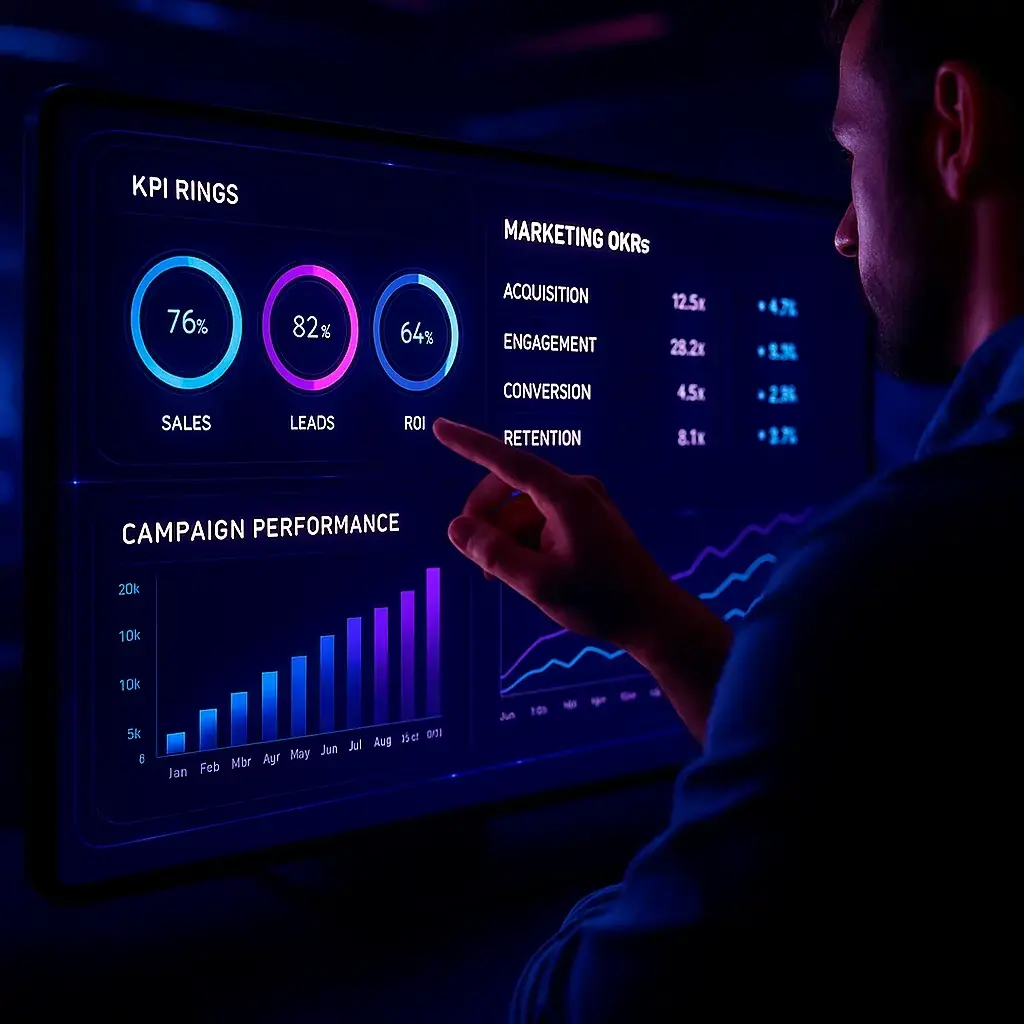Build a Marketing Plan That Actually Drives Revenue
We define your growth priorities, identify where value is created, and build a roadmap that connects your funnel, channels, and commercial goals in one coherent plan.
Board-ready growth audit in minutes. Positioning leaks, conversion gaps, trust signals, and unanswered buyer questions.
Leading the Way in Hybrid AI-Human Marketing.
Without a clear, data-driven growth strategy, teams waste time on scattered activity that fails to drive traction, scale, or commercial clarity.
We design marketing strategies that win confidence from leadership, unlock faster decisions, and give teams a clear path to consistent, scalable growth.
Random acts of marketing
Action over motion
No meaningful measurement
Strategic Growth Planning
We define your growth priorities, identify where value is created, and build a roadmap that connects your funnel, channels, and commercial goals in one coherent plan.

AI-Enabled CMO on Demand
Gain access to senior marketing leadership without the full-time cost. Our Fractional CMOs are supported by AMP, enabling faster execution, deeper insights, and more agile decisions.

Marketing OKRs & Dashboards
We design and install custom OKRs and dashboards to track performance against strategy, giving stakeholders clear visibility and confidence in marketing outcomes.

Channel Mix & Budget Framework
We map the right channel mix for your stage, assign resource ownership, and tie spend to milestones that support growth, scale, and board-level reporting.

The Agentic Marketing Platform™ (AMP) powers our human led marketing with intelligent AI agents to deliver faster decisions, greater efficiency, and smarter execution.
AMP connects performance data, buyer signals, and planning logic to help leaders make sharper marketing decisions without waiting for quarterly reviews.

It automates tracking, aligns OKRs, and integrates planning inputs across teams so your strategy gets executed faster, with fewer meetings and no lost context.

AMP constantly learns from what works and what doesn’t, recommending strategic adjustments that improve channel mix, messaging, and growth levers quarter by quarter.


Get a board-ready growth audit in minutes. We'll analyse your positioning clarity, conversion leaks across your funnel, trust gaps in proof and compliance, and the real buyer questions your site isn't answering. Clear problems, clear fixes, clear impact.
"Since being onboarded to their solution, we’ve undergone a strategic reboot that has not only clarified our core narrative but also unlocked new opportunities for targeted engagement."
Paul Taylor, CMO, Blue Prism
“Most impressively, their AI-enhanced Growth Agent solution was operational in record time, giving us a significant competitive edge in our Go-to-Market strategy. It's been an eye-opening journey.”
Andrew Carr, Managing Director, Camwood
How does AMP improve our growth strategy?
AMP connects insights across tools and teams to highlight what’s working and where to invest. This sharpens your roadmap, budget use, and strategic bets.
What’s included in CMO on Demand?
You get senior marketing leadership without the full-time cost, supported by AMP for faster analysis, leaner planning, and smarter execution decisions.
Do you build or manage our team?
We don’t replace your team, we guide and optimise it. The CMO role provides strategic direction, with AMP reducing manual oversight and operational drag.
Can we scale this engagement up or down?
Yes. Our CMO on Demand model flexes with your needs, whether you’re raising, scaling, or stabilising. Engagements can grow, pause, or contract as needed.
How quickly will we see results?
You’ll start making clearer, faster decisions within the first few weeks. Strategic outcomes typically follow as the plan activates, supported by AMP’s continuous performance insight.